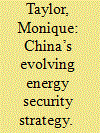| Srl | Item |
| 1 |
ID:
151987


|
|
|
|
|
| Summary/Abstract |
Since the Asian financial crisis, the Association of Southeast Asian Nations (ASEAN) has sought to reorient itself towards becoming a ‘people-oriented’ association. Democratic transitions in the region and increased demands from civil society to be actively involved in regional governance have prompted ASEAN to develop forms of participatory regionalism. In practice, however, the rhetorical aspirations of ASEAN have not often matched the level of participation or support expected by civil society organisations. It has often been the case that ASEAN's decisions, especially those related to sensitive issues, have been influenced by external pressure as opposed to participatory mechanisms. The aim of this article is to determine to what extent participatory mechanisms impact ASEAN's approach to non-traditional security. By doing so, the authors combine two key elements central to a ‘people-oriented’ approach to regionalism: the incorporation of deliberative and participatory processes and the acknowledgement of transboundary security issues which require cooperation to move beyond state-centric approaches. This article explains that despite the rhetorical emphasis on participatory regionalism, it continues to be the case that regional civil society organisations and non-state actors have limited capacity to influence ASEAN. By providing a critical analysis of influences on ASEAN's non-traditional security policies, the authors offer a modest yet valuable contribution to the emerging literature on ASEAN's ‘people-oriented’ regionalism and advance a nuanced understanding of ASEAN's participatory mechanisms.
|
|
|
|
|
|
|
|
|
|
|
|
|
|
|
|
| 2 |
ID:
183186


|
|
|
|
|
| Summary/Abstract |
This article explores the ways in which China's energy security strategy has evolved over the past fifteen years. Energy security had become an urgent policy priority for Beijing by the mid-2000s due to China's rapidly increasing oil import dependency set against the backdrop of oil scarcity and rising oil prices. Rather than rely on purely market-based means to secure oil supply, China pursued a state-led or neomercantilist approach. Initially, the most notable and distinctive element of its oil neomercantilism was the overseas acquisition of oil assets by China's national oil companies (NOCs) under broad strategic direction from Beijing. However, increasingly over the past decade China's energy security strategy, while remaining neomercantilist in orientation, exhibits greater reliance on the market. Reasons for this shifting emphasis include the changing geopolitics and geoeconomics of the global oil industry, which moved to oversupply following the US shale oil revolution, along with transformations within the Chinese state under the leadership of President Xi Jinping.
|
|
|
|
|
|
|
|
|
|
|
|
|
|
|
|